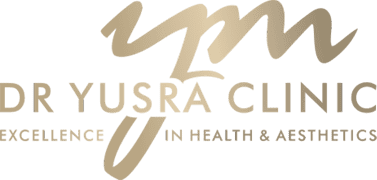Redness, Rosacea, and Sensitivity: How We Calm and Strengthen Delicate Skin
Posted on 14th May 2025 by Olivia

Some skin speaks louder than words.
Flushes of crimson, reactive flare-ups, stinging, tightness, if your skin’s version of communication is a cycle of redness and irritation, you’re not alone. At Dr Yusra Clinic, we specialise in decoding the messages of sensitive, rosacea-prone skin and more importantly, in calming the chaos. Whether you’re battling long-standing redness or reacting to even the gentlest of products, understanding the roots of sensitivity is the first step to achieving calm, resilient skin that glows with health and confidence.
Understanding the Difference: Redness, Rosacea, and Sensitive Skin
Redness is a symptom, not a diagnosis. But behind that crimson flush lie a variety of potential causes, each requiring a tailored approach.
Sensitive skin is often a result of a compromised barrier. It can sting, burn, or react to heat, cold, or ingredients that others find soothing. Rosacea, on the other hand, is a chronic inflammatory condition that causes persistent redness, visible blood vessels (capillaries), and sometimes acne-like bumps. It often starts subtly but worsens over time without proper care.
Then there’s general reactivity, skin that seems to flare at a moment’s notice. It may not be clinically sensitive or rosacea-prone, but it still rebels against changes in skincare, weather, or stress.
Discerning which of these your skin falls under isn’t just helpful, it’s essential. Each requires a unique, informed plan for long-term improvement.
What Causes Skin Sensitivity and Redness?
For many, skin sensitivity is written into their DNA. A naturally thinner stratum corneum, or outermost layer, makes it easier for irritants to penetrate and for moisture to escape. But genetics are just the beginning.
Environmental aggressors, UV exposure, cold winds, heat, or pollution, can trigger and worsen reactivity. Even over-cleansing or exfoliating can degrade the skin’s natural lipid barrier.
Hormones, stress, diet, and gut health can also play a role. A high-sugar diet or excessive alcohol can increase inflammation, while stress hormones like cortisol can weaken skin resilience.
Then there’s the hidden culprit: product overload. A bathroom cabinet packed with actives, retinol, AHAs, vitamin C, might promise youthfulness, but can backfire on already compromised skin.
Rosacea Uncovered: Symptoms, Triggers, and Treatment
Rosacea affects around 1 in 10 people in the UK, yet it remains underdiagnosed and misunderstood.
There are four subtypes of rosacea:
- Erythematotelangiectatic Rosacea (ETR) – persistent redness, flushing, and visible blood vessels.
- Papulopustular Rosacea – redness with acne-like breakouts.
- Phymatous Rosacea – thickened skin, usually on the nose (rhinophyma).
- Ocular Rosacea – dry, irritated eyes and swollen eyelids.
Common triggers include spicy foods, caffeine, alcohol (especially red wine), hot drinks, and sudden temperature changes. Emotional stress is also a major contributor.
While there is no cure, professional intervention can control and calm symptoms significantly. At Dr Yusra Clinic, we take a holistic view, considering internal triggers as well as external treatments, to deliver a calm, strengthened complexion.
The Power of Calming Ingredients for Inflamed Skin
Calming sensitive or rosacea-prone skin begins with the right topicals. Our curated protocols include:
- Niacinamide: A multi-tasking wonder, niacinamide reduces inflammation, supports barrier function, and strengthens the skin’s immunity.
- Azelaic Acid: Antimicrobial and anti-inflammatory, it soothes rosacea while gently exfoliating.
- Centella Asiatica: A botanical powerhouse that promotes collagen while calming irritation.
- Ceramides: Lipids that rebuild the skin barrier and reduce transepidermal water loss.
- Panthenol and Allantoin: Hydrating, healing ingredients that restore balance to stressed skin.
These actives are clinically backed and hand-selected in our protocols, especially for skin undergoing personalised treatment in Liverpool, London, and Manchester.
Strengthening the Skin Barrier: Why It’s Essential for Sensitive Skin
Think of the skin barrier as your body’s frontline defence, an invisible shield of oils, cells, and proteins. When compromised, it allows irritants in and precious hydration out. The result? Redness, tightness, and chronic inflammation.
Strengthening the skin barrier isn’t a quick fix; it’s a marathon of consistency and restraint. Using gentle, pH-balanced cleansers, barrier-repair moisturisers, and SPF daily creates the optimal environment for healing.
At Dr Yusra Clinic, skin barrier repair is foundational to every treatment plan. From polynucleotide therapy to post-treatment protocols, we always protect and restore the skin’s innate defences.
Professional Treatments to Soothe and Support Delicate Skin
While home care lays the groundwork, clinic-led treatments offer the transformation. Our most popular modalities for sensitive, red, or rosacea-prone skin include:
- LED Light Therapy: Harnessing red and near-infrared wavelengths, LED light reduces inflammation and promotes cellular repair.
- Polynucleotides: These regenerative biostimulators repair the skin’s structure, calm inflammation, and rebuild dermal density, ideal for reactive skin.
- IPL (Intense Pulsed Light): A gold standard for rosacea, IPL reduces visible vessels and persistent redness with precision.
- Medical-grade Skincare: When tailored to sensitive skin, these advanced formulations gently restore balance, reduce inflammation, and infuse healing ingredients deep into the skin for lasting resilience. Patients with chronic rosacea may require prescription skincare like soolanthra (Ivermectin) that reduce the activity of demodex mites on the skin.
Each treatment at Dr Yusra Clinic is bespoke. We tailor every protocol to your skin’s needs, not just its symptoms, to build long-lasting resilience.
Do’s and Don’ts: How to Care for Sensitive or Rosacea-Prone Skin at Home
Do:
- Use a fragrance-free, sulphate-free cleanser morning and night.
- Apply a barrier-repair moisturiser after cleansing, preferably one rich in ceramides and cholesterol.
- Wear SPF 50 daily, even in winter. UV is one of the top rosacea triggers.
- Choose lukewarm water over hot, and pat dry gently with a soft cloth.
- Introduce one new product at a time and patch test before applying to the full face.
Don’t:
- Avoid scrubs, harsh exfoliants, and overly acidic toners.
- Skip products with alcohol, essential oils, or strong preservatives.
- Don’t layer multiple actives; less is more.
- Don’t use steroid creams unless prescribed by a medical professional; they can thin the skin and worsen rosacea over time.
Medical vs Cosmetic: When to See a Professional for Rosacea
Over-the-counter products may offer temporary relief, but if your skin’s redness is persistent, painful, or spreading, it’s time to seek professional support.
At Dr Yusra Clinic, our approach blends medical insight with aesthetic finesse. We assess your skin under the lens of dermatological understanding, aesthetic balance, and emotional wellbeing, because redness doesn’t just affect the face; it affects confidence, too.
From our flagship London clinic to Liverpool and Manchester, our team of medically trained practitioners deliver results-driven plans rooted in science. No guesswork. No gimmicks.
Ready to Restore Calm and Confidence?
Let us help you reclaim harmony, strength, and clarity in your skin. Whether it’s rosacea, reactive sensitivity, or unexplained redness, there is a path forward, and we’re here to walk it with you.
Dr Yusra Clinic | Liverpool | London | Manchester
0333 224 4666
info@dryusra.com


